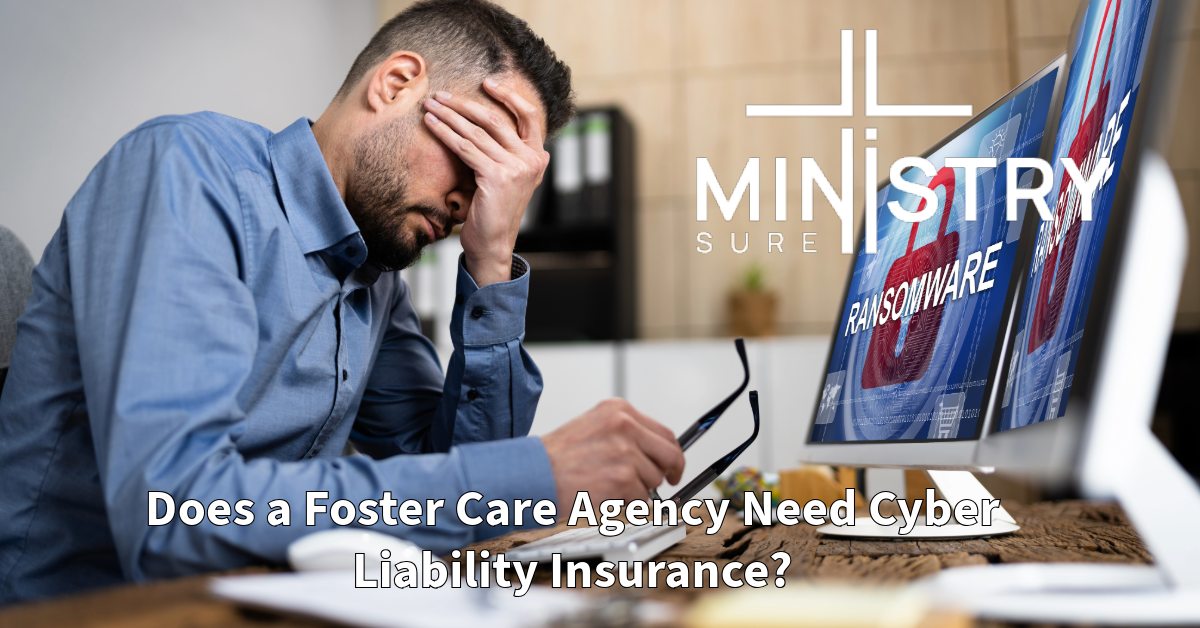Today, in businesses of all shapes and sizes, the rise of cyber threats poses significant risks for organizations across all sectors, and foster care agencies are no exception. Although the focus of many foster care agencies is on providing safe homes and care for vulnerable children, the digital aspect of their operations, including sensitive personal data collection, makes them prime targets for cyber-attacks. This is where cyber liability insurance becomes essential.
A New Threat in Foster Care Operations

Jessica, the director of a small foster care agency in Georgia, was used to handling challenges—placement shortages, emergency calls, and organizing social workers’ schedules. But nothing prepared her for the morning she received an email from her IT provider stating that their entire system had been compromised by a ransomware attack. Not only were they locked out of critical files, but the hackers demanded thousands of dollars in exchange for returning access.
Suddenly, every file on every child and foster parent was at risk, from social security numbers to private medical records. For Jessica’s agency, the attack was not only a breach of sensitive data but a crisis that had the potential to derail their mission and reputation.
This scenario is becoming all too common for agencies like Jessica’s. For foster care agencies, which handle sensitive data about children, foster families, and staff, a cyber-attack can cause reputational damage, financial loss, and legal liabilities. This is why cyber liability insurance is essential.
Understanding Cyber Risks in Foster Care
Foster care agencies handle vast amounts of sensitive information about the children they place, the foster parents, and social workers who work with them. Personal data, including Social Security numbers, medical histories, and even legal records, are stored digitally. This makes these agencies a prime target for hackers seeking valuable information for financial extortion or identity theft.
A successful cyber incident could lead to exposure of sensitive records, potentially putting vulnerable children and foster families at risk. Aside from financial loss, agencies could face lawsuits, regulatory fines, and a loss of trust from the community they serve.
For instance, if an agency is the victim of a ransomware attack, where hackers encrypt critical files and demand payment for their release, the cost of dealing with the cyber threats can be immense. Between the ransom, potential downtime (resulting in business interruption), and costs to restore affected systems, a foster care agency could find itself on the brink of closure.
What Does Cyber Liability Insurance Cover?
Cyber liability insurance offers a protective safety net against these digital threats. It covers expenses that result from cyber-attacks, including legal costs, financial losses, and public relations efforts to restore the agency’s reputation. The coverage typically includes:
- Data Breach Costs: This includes notifying affected parties, legal fees, and the costs associated with restoring lost data.
- Legal Defense Costs: If the breach results in legal action, cyber insurance will cover attorney fees, court costs, and any settlements that may be required.
- Business Interruption: If a cyber incident leads to a halt in operations, cyber insurance policies provide financial relief for lost income during downtime.
- Cyber Extortion and Ransomware: In the case of ransomware attacks, where hackers demand money to unlock encrypted files, cyber insurance can cover the cost of the ransom.
- Public Relations Costs: Maintaining an agency’s reputation after a breach is critical. Cyber insurance often covers the cost of hiring a PR firm to manage public perception and communications post-breach.
Why Foster Care Agencies Are Vulnerable
Foster care agencies often operate with limited resources, which makes them particularly vulnerable to cyber risks. With budgets that prioritize the welfare of children, investments in cutting-edge cybersecurity tools or staff training may take a back seat. This leaves the agency’s systems exposed to hackers looking for easy targets.
Moreover, the sensitive nature of the data handled by these agencies makes them particularly attractive to cyber criminals. A breach that exposes the personal information of children and foster families could lead to identity theft, leaving victims to deal with the aftermath for years to come.
While some agencies might believe that they are too small to be a target, cyber threats don’t discriminate based on size. In fact, smaller agencies are often seen as easier targets because they typically lack robust cybersecurity measures.
Regulatory Compliance
In recent years, there has been an increase in regulatory requirements surrounding data protection, particularly with laws like the GDPR (General Data Protection Regulation) and CCPA (California Consumer Privacy Act). Agencies must comply with these regulations, which include provisions on data storage, access, and breach reporting.
Failing to meet these regulations can result in hefty fines, further compounding the financial impact of a cyber attack. Cyber liability insurance helps agencies navigate these regulatory requirements, covering fines and assisting in breach notification procedures, ensuring that the agency stays compliant with the law.
Protecting Foster Children and Families
At the heart of foster care agencies’ operations are the children and families they serve. Protecting their personal information is crucial, not just from a legal standpoint but also an ethical one. When agencies fail to secure their data, they potentially expose vulnerable populations to harm.
Consider the ramifications if a cyber incident results in the release of confidential information about a child’s case or a foster family’s history. The damage could be more than just financial—it could destroy trust, affect placements, and impact the well-being of foster children.
By investing in cyber liability insurance, agencies are not just protecting themselves; they are taking proactive steps to safeguard the children and families who rely on their services.
The Cost of Not Having Cyber Liability Insurance
The financial consequences of a cyber attack can be devastating. Without cyber liability coverage, a foster care agency may be forced to absorb all the costs associated with a breach. This could include:
- Paying for credit monitoring services for affected individuals.
- Covering the costs of restoring lost data.
- Legal fees and settlements for claims brought against the agency.
- Lost income due to business interruption.
- The expense of hiring a PR firm to repair reputational damage.
For many foster care agencies, these costs are insurmountable. Cyber liability insurance provides a much-needed safety net, allowing agencies to focus on what matters most—caring for children—without worrying about the financial fallout of a cyber attack.
Be Certain With MinistrySure
In today’s digital age, foster care agencies cannot afford to overlook the importance of cyber liability insurance. With the increasing prevalence of cyber threats and the sensitive data these agencies handle, having the right protection in place is crucial. Not only does cyber liability insurance provide financial protection in the event of a cyber incident, but it also ensures that agencies can continue serving their communities without disruption.
For more information on comprehensive insurance options for foster care agencies, check out this article.
By investing in cyber insurance, foster care agencies can protect their data, their finances, and the vulnerable populations they serve.






